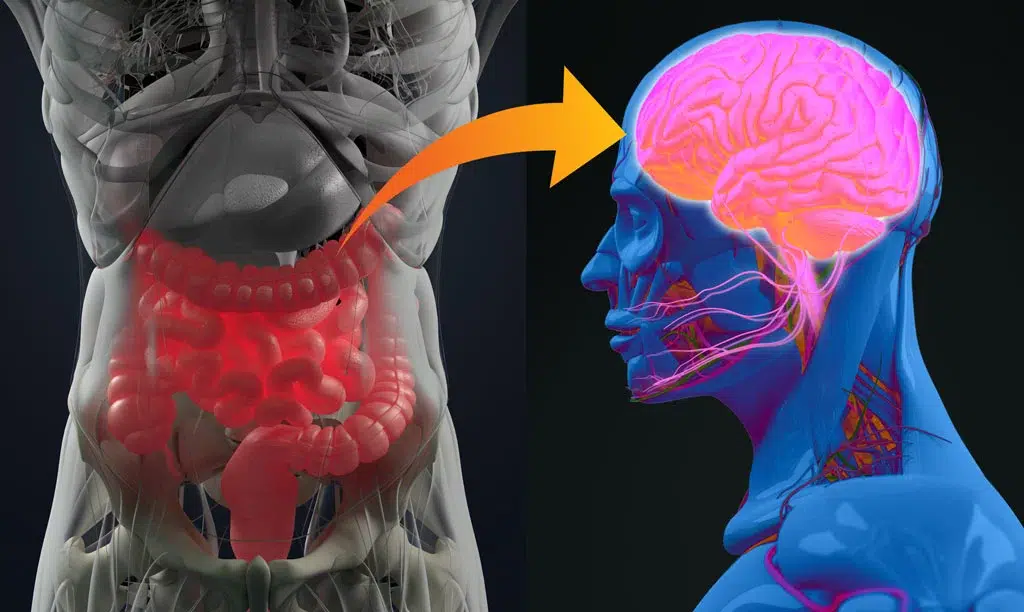What Is Gut Health?
Table of Contents
The term Gut health refers to the state of your digestive system. Sometimes, it is called “gut flora” or the “microbiome.” The gut is home to trillions of microorganisms that help digest food, absorb nutrients and protect against disease. The microbiome comprises bacteria, viruses, fungi, and other single-celled organisms.
Most of these organisms live in the large intestine (colon), but some also live in the small intestine and stomach. Gut health affects how well you absorb nutrients from food, how much energy you get from it, and the strength of your immune system, and can even impact how quickly you feel hungry or full after eating.
What Is the Connection Between The Gut Health And Mental Health?
Many don’t know this, but the health of your gut and the brain are deeply related systems. Known as the gut-brain axis, this is the connection between the gastrointestinal tract and the nervous system, including the brain. It is a bidirectional communication system that regulates digestion, physiology, and even behavior.
The enteric nervous system or ENS is a neural network in our gut that helps us digest food and absorb nutrients. The ENS consists of 100 million neurons that help regulate digestion, blood flow, and motility. About 90% of these neurons are found in the colon, with only 10% in our small intestines.
Free Mental Health Assessment
What Does Gut Health Affect?
The gut-brain axis also controls many digestive processes, including digestion, absorption, and the assimilation of valuable nutrients; immune response; toxin management; and mood control and mental health — all of which are essential for optimal health. The gut-brain axis also plays a role in obesity, diabetes, irritable bowel syndrome (IBS), and even cancer.
Studies have shown that people with depression have different bacteria levels in their gut than people without depression. But scientists are still figuring out how this works in humans — there are still many questions about how diet affects our mental health. Research into the depth of the gut-brain axis is continuing, but new discoveries bode well for a better understanding of this crucial connection.
How Do Your Brain and Gut Communicate?
You know that the gut contains millions of neurons and has its own nervous system (enteric nervous system), but did you know that it also has more neurotransmitters than the brain, which help to regulate digestion, immune function, and even mood? Your gut produces up to 90% of the Serotonin in your body!
This essentially means that when something goes wrong in your gut (for example, you have irritable bowel syndrome), it can significantly affect your brain health!
So how does this communication work? How does your gut talk to your brain? Your gut sends signals to your brain through two main pathways: hormones and nerves. These signals travel from your intestines through either the blood or spinal cord to reach various parts of your brain. Signals from hormones include:
- Leptin, which regulates appetite and metabolism by telling your body when it’s had enough food, is produced by fat cells in adipose tissues throughout the body. Leptin levels are also affected by exercise and dieting.
- Ghrelin, which increases your appetite for carbohydrates; produced by cells lining the stomach; ghrelin levels increase before meals and drop after eating.
Why does all of this matter? The link between mental illness and gastrointestinal health is pretty strong. Many people with anxiety or depression may have an underlying gastrointestinal problem contributing to their condition. It also potentially means that treating these conditions may require medical attention beyond simply adjusting lifestyle choices like diet or exercise.
This is not to say that habits such as those aren’t necessary. They can be a critical component to healing and recovery in a very real way.
What Are the Side Effects Of Poor Gut Health?
The gut is the body’s largest immune system organ, so it’s no surprise that an unhealthy gut can lead to many health problems. Not taking care of one’s gut will eventually cause several different types of illnesses that could have easily been prevented. Poor gut health is linked to everything from weight gain and chronic inflammation to depression and reduced cognitive function. Here are some of the most common symptoms of poor gut health:
- Mental Health issues: If your gut health suffers, it can affect your mental health, resulting in anxiety and depression.
- Fatigue: Poor gut health can cause your body to have difficulty absorbing nutrients from food, which may leave you feeling tired.
- Digestive issues: A leaky gut can cause digestive problems such as constipation, diarrhea, bloating, and gas.
- Autoimmune diseases: Gut issues can trigger an immune response that leads to the development of autoimmune diseases such as celiac disease or rheumatoid arthritis. Autoimmune diseases occur when white blood cells attack healthy cells in the body by mistake because they think that those cells are foreign invaders.
- Joint pain and inflammation: Gut issues can be linked to joint pain because they cause inflammation throughout the body — including in your joints.
- Food sensitivities: Food sensitivities can develop due to gut issues, making it hard for your body to digest certain foods and absorb their nutrients properly.
24 Hour Mental Health Hotline
Psychosomatic Illnesses and Gut Health
The term “Psychosomatic illnesses” refers to physical illnesses with a psychological cause. Common examples include irritable bowel syndrome (IBS) and chronic fatigue syndrome (CFS). The link between psychology and gut health is not well understood. However, there are many theories about how our emotions can affect our digestive system. For example:
- A stressful or traumatic life event can increase stress hormones, triggering IBS symptoms.
- It’s also possible that stress may make you more likely to eat unhealthy foods that are poor for your digestion, such as sugary snacks or fatty foods, which invariably can negatively affect gut health.
- A person in a state of perpetual and constant stress may be unknowingly harming their gut health because the cells in your intestines become more sensitive to stress hormones like adrenaline (epinephrine) and cortisol. This can often lead to changes in how well food moves through your intestines, triggering diarrhea, constipation, and nausea.
Some treatments have a history of being effective in helping to treat psychosomatic illness, including CBT, medication (in the form of antidepressants), and a healthy meditation habit. Much of preventing psychosomatic illnesses lies in the ability to regulate and reduce stress levels.
Regular exercise and a proper sleep schedule are two things you could feasibly have a degree of control over in your life that potentially contribute significantly to preventing the development or recurrence of psychosomatic illnesses.
How Can I Take Care of Gut Health And Mental Health?
A healthy gut will help you feel better and think better, while a healthy brain helps to keep your gut working properly. In this way, the two organs really do support and bolster one another. Here’s how you can maintain both a healthy gut and a healthy mind:
- Eat a balanced diet. Your body needs various nutrients to thrive, including vitamins and minerals, protein, carbohydrates, fats, and fiber. You should also be getting enough water every day (about 8 cups to be safe!).
- Stay active. Exercise boosts circulation throughout your body, which helps transport oxygen to your cells more efficiently. It also releases endorphins — hormones that make you feel happier — into your bloodstream.
- Get enough sleep every night (about 7-8 hours for the average adult). The vital process of sleep allows your body to repair itself after a long day of activity. It also helps your brain consolidate memories to be easier to recall in the future.
These are excellent habits to integrate into your life, and they absolutely do a lot to help with gut-related issues overall. However, they are NOT a “cure-all.” While scientifically proven to have holistic benefits to one’s gut health (and, by extension, mental and overall body health), in certain situations, there may be the need for intervention or treatment organized and monitored by professionals to effect proper and lasting improvements.
What Are Effective Ways to Treat Mental Health And Diet Issues?
There are many effective methods of treating mental health and diet issues. Some of these include but are not limited to:
- Psychotherapy: This type of treatment can help you understand the root trauma responsible for mental health problems and how to cope with them. It can also help you change unhealthy behaviors and learn new skills to manage your symptoms more effectively.
- Medication: Medications can be helpful for anxiety disorders, depression, and other mental health conditions, as well as for eating disorders. There are many different types of medications that can be used to treat these disorders, so it’s essential to work with a qualified professional to diagnose the core issue and prescribe the drug that would work best for you.
- Nutrition Counseling/Diet Therapy: Eating healthy foods can help prevent nutritional deficiencies that can worsen some kinds of depression or even trigger them in people with certain deficiencies (such as iron deficiency). Having a healthy relationship with food is critical to taking care of our gut health. An unhealthy one can result from something more serious like depression or an overt eating disorder.
However, it can also be the simple result of miseducation or ignorance. Engaging in Nutrition Counseling can be extremely helpful for most people. Becoming educated about how best to have a relationship with food can only potentially be a good thing. The benefits you reap from improving in this way extend to your gut and all aspects of your life subsequently.
Addressing The Root Cause of Mental Illness With Residential Care
Mental illness is an umbrella term that describes various conditions, including depression and anxiety disorders, schizophrenia, eating disorders, and post-traumatic stress disorder (PTSD).
More than 40 million Americans suffer from some form of mental illness, and only one in three people with a mental illness receive treatment to help manage those symptoms. It is essential to address the root causes of mental illness when treating mental health issues.
Residential care allows patients to receive round-the-clock medical attention from skilled professionals who can help manage symptoms, so they no longer disrupt daily life. On-site psychiatrists or social workers can also communicate and liaise closely with family members to address any concerns about their loved one’s condition and how it affects them personally.
One of the core reasons residential care can be so effective is because it offers the patient a safe place for people with long-term mental health illnesses to live with support from other people with similar problems or who have been through similar, shared experiences.
How Are Gut and Mental Health Issues Treated at A Holistic Rehab?
Holistic rehabilitation is a unique approach to addiction treatment and recovery. It considers all aspects of your life, including physical health, mental health, and social well-being. Holistic rehabilitation treats the whole person, not just the addiction.
While traditional treatment focuses on helping you stop using drugs, alcohol, OR even food (so-called substance abuse), holistic rehabilitation tackles all aspects of your life that may affect and fuel your addiction.
This includes physical health, mental health, family relationships, and other personal issues. A holistic rehab facility is a place where you can go to heal your body, mind, and spirit. The staff will help you learn how to live a healthier lifestyle to avoid future health problems.
Immediate Placement for Mental Health Treatment
The Benefits of Holistic Treatment for Gut Health and Mental Health
Typically, at a holistic rehab facility, you are exposed to evidence-based treatments like Cognitive Behavioral Therapy (CBT) or Talk Therapy alongside holistic lifestyle practices and habits. These lifestyle changes or habits one might be exposed to include meditation, exercise routines or regimens, and even nutrition counseling or consultations.
It is critical to note that both the holistic and evidence-based treatments must be employed as necessary without sacrificing one or the other. If a patient is struggling with an eating disorder fueled by their depression, giving them the tools to help themselves in the form of nutrition consultation will do precious little until the underlying eating disorder and depression has been addressed.
Emerald Isle Recovery is a holistic rehab center that looks after our clients with care and attention. We understand that gut health plays a crucial part in mental health and as such, we take care of the entire individual. If you’re ready to seek out help for your mental illness, our phone lines are always open. Contact us today to learn more about our holistic approach to mental health recovery.



